|
De Franse schrijver Jean Christophe Grangé werd geboren op 15 juli 1961 in Parijs. Zie ook alle tags voor Jean Christophe Grangé op dit blog.
Uit: De passagier (Vertaald door Floor Bosboom)
“Het gerinkel boorde zich als een gloeiende naald door zijn bewustzijn. I Iij droomde van een zonovergoten muur. Hij volgde zijn schaduw op de witte wand, die begin noch eind had. De muur was het universum. Strak, verblindend, onverschillig ... Weer dat gerinkel ... Hij opende zijn ogen. Zag de oplichtende cijfers van de kwartswekker die naast hem stond. 4:oz. Hij hees zich op een elleboog. Zocht op de tast naar de hoorn. Zijn hand tastte in het niets. Hij herinnerde zich dat hij in de rustkamer was. Hij voelde aan de zakken van zijn witte jas, vond zijn mobiel. Keek op het schermpje. Hij kende het nummer niet. Hij nam op zonder zijn naam te noemen. Een stem klonk op in het donkere vertrek. `Dokter Freire?' Hij gaf geen antwoord. `Bent u dokter Mathias Freire, de dienstdoende psychiater?' De stem leek van heel ver te komen. Nog steeds die droom. De muur, het witte licht, de schaduw ... Ja, dat ben ik', zei hij eindelijk. `Ik ben dokter Fillon. Ik heb nachtdienst in de wijk Saint-Jean Belcier.' `Waarom belt u me op dit nummer?' `Dat hebben ze me opgegeven. Ik stoor u toch niet?' Zijn ogen raakten gewend aan het donker. De lichtbak. Het metalen bureau. De afgesloten medicijnkast. De rustkamer was gewoon een spreekkamer met het licht uit. Hij sliep op de behandeltafel. `Wat is er aan de hand?' gromde hij terwijl hij overeind kwam. `Een vreemde toestand bij station Saint-Jean. Bewakers hebben er tegen middernacht een man aangetroffen. Een zwerver die zich had verstopt in een loods langs het spoor.' De dokter klonk gespannen. Freire keek nog eens naar de wekker: 4:05. `Ze hebben hem naar de eerstehulppost gebracht en het politiebureau op de place des Capucins gebeld. De politie heeft hem meegenomen en mij gebeld. Ik heb hem op het bureau onderzocht.' `Is hij gewond?' `Nee. Maar hij weet helemaal niets meer. Complete amnesie.' Freire gaapte: 'Doet hij niet alsof?' `13. bent de specialist. Maar ik geloof van niet, nee. Het is net alsof hij van een andere planeet komt. Of eigenlijk uit het niets.' `Gaat de politie me bellen?' `Nee. Ze brengen die vent naar u toe.' `Bedankt', zei hij op ironische toon. `Ik meen het. U kunt hem helpen. Ik weet het zeker.' `Hebt u een doktersattest opgesteld?' `Dat heeft hij bij zich. Succes ermee.' De man hing snel op. Mathias Freire bleef bewegingloos zitten. De ingesprektoon boorde zich in het donker door zijn trommelvlies. Het was beslist zijn nacht niet. Het feest was om zr.00 uur begonnen. Op de afdeling Gedwongen Opnames had een nieuweling in zijn kamer gescheten, zijn uitwerpselen opgegeten en toen de pols gebroken van een verpleger. Een half uur later had een schizofrene patiënt zich op de afdeling West met stukjes linoleum de aderen doorgesneden.”
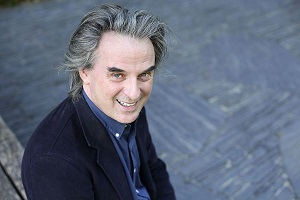
Jean Christophe Grangé (Parijs, 15 juli 1961)
De Marokkaanse schrijver Driss Chraïbi werd geboren in El Jadida op 15 juli 1926. Zie ook alle tags voor Driss Chraïbi op dit blog.
Uit: Vu, lu, entendu
« Je remercie la vie. Elle m'a comblé. En regard d'elle, tout le reste est littérature, pour ne pas dire solitude. A mon âge — soixante et onze ans déjà —je remonte à pas paisibles le chemin parcouru, sans notion de temps ou d'espace. Je nie tourne vers mon passé. J'essaie tout au moins. À George Bernard Shaw, mon regretté confrère d'outre-Manche, une dame d'un âge certain avouait, le rose aux joues, qu'elle avait trente ans. « Ah bon ! répondit le vieux pince-sans-rire, mais à quel âge êtes-vous née ? Toutes proportions gardées, c'est la question qu'il aurait pu me poser. Non que je sois une femme : vous me connaksei Mais il subsiste un léger doute quant à la date de ma naissance, un certain décalage entre l'oral et l'écrit. On ne récuse pas l'écrit, surtout s'il est officiel. Quant à l'oral...
Considérons la version officielle. J'ai vu le jour au Maroc, à El-Jadida (Mazagan à l'époque du Protec-torat), au bord de la mer. Le lieu de naissance ainsi précisé, reste à déterminer la date. Chez nous, les « indigènes », il n'y avait pas d'état civil. Et, comme on l'a écrit et affirmé souvent depuis les Croisades, dans le monde arabo-musulman le temps ne compte guère, en dépit de la passion des Marocains pour les montres de haute précision. Mais il nous fallait nous « civiliser », selon le manuel français d'Histoire, celui-là même qui vantait mes ancêtres gaulois. Pour entrer au lycée Lyautey de Casablanca, je devais avoir une carte d'identité — et donc un âge légal. Vêtu d'une djellaba blanche et accompagné de deux témoins dignes de foi qui lui devaient de l'argent, mon père me conduisit par la main au commissariat dc police. C'était un après-midi torride, au début de la Seconde Guerre mondiale. Gravement, il déclara au commissaire que je m'appelais Driss avec deux « s » s'il vous plaît, Idriss en arabe mais on prononce Driss, que j'étais bien son fils et qu'il était content de moi, oui, monsieur, sage, obéissant, stu-dieux... — Son âge, dites-vous ? Oh ! c'était l'époque des
Vu, lu, entendu 11 moissons quand, avec l'aide de Dieu, il est venu au monde. — Quelles moissons ? demanda le commissaire qui transpirait à grosses gouttes. Orge, avoine, maïs, blé dur ? — Blé dur, dit mon père."
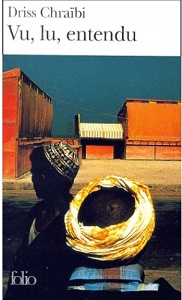
Driss Chraïbi (15 juli 1926 – 1 april 2007)
Cover
De Iers-Britse schrijfster en filosofe Iris Murdoch werd geboren in Dublin op 15 juli 1919. Zie ook alle tags voor Iris Murdoch op dit blog.
Uit: Living on Paper: Letters from Iris Murdoch 1934-1995
“To David Hicks, who had abandoned his Diploma of Education course in order to work for the British Council in Egypt.
Somerville College 29 April 1940
Dear David, My greetings. How is it with you? I think of you decorating the skyline on a camel and taking your well-earned siesta in the shade of a pyramid. Or is Egypt not romantic? Yes, I know. I had an aunt once who used to teach the young Egyptians to love God. What do you teach them? I hope it's something with an equally good moral. And altogether, how wags the world in your region of it? You and your pyramids seem almost as fabulous and mythical to me as Oxford and I must seem to you now I expect an act of faith is necessary to persuade yourself you ever were here. (But you were, I remember you quite distinctly) Everything here seems curiously the same — and yet I don't know why it should, for every month batches of men fade away into khaki, and Balliol is full of glossy civil servants from Whitehall. Worcester is still largely academic — I go there twice a week to hear Pickard-Cambridge' talking about moral philosophy. Lectures and all the clubs proceed as before, and the only difference it all makes to me is that I have ten times as much organisational work to do as I would normally, owing to the increasing man-shortage. I have just done Mods, and got the distinguished second which you once so kindly predicted for me. (Damn you. I held that against you for a long time. I suppose it would be unreasonable to bear the grudge any longer) and now I am doing Greats. The philosophy is not as philosophical as one would wish, but the ancient history is very ancient (especially in the matter of the dons appertaining thereto) and I find them both pretty good mental exercise.
The personelle of the university has changed tremendously. Freeling and Lucy are vanished as though they had never been. Carol I hear of spas-modically achieving great things in the Ministry of Economic Warfare. A few old-timers like Jack Dawes and Denis Healey are still here and active. Peter Shinnie is in the air force and getting incredibly tough — others of them are in the artillery and fleet air arm. None of the women whom you knew, I'm glad to say, has joined the ATS.° Myself, I am incredibly busy this term with committees . J and with acting. You see I have achieved one of my ambitions, to play the chorus leader in Murder in the Cathedral.' Christ Church dramatic society is doing it and our stage is the cloister quad at Christ Church with the cathedral as a backcloth. Also I am bringing out a revised version — an editio maioe rather — of your song sheet. (Remember?) The world — yes. It's a pretty interesting and fast-moving little world these days. There's a lot to be depressed about certainly, but I can't say I feel very fundamentally downhearted. In fact I've never felt so full of hope and new life as I do now. We're not doing so badly. Meanwhile this place is raving wild with spring. I met a calf this morning that looked like Michelangelo's Moses' — and the calf's mother was like Epstein's Madonna.' I won't tell you about the cherry trees or how green the Cherwell banks are, or you'll be homesick.”
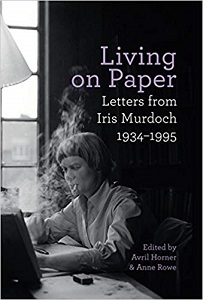
Iris Murdoch (15 juli 1919 – 8 februari 1999)
Cover
De Amerikaanse schrijver Richard Russo werd geboren op 15 juli 1949 in Johnstown, New York. Zie ook alle tags voor Richard Russo op dit blog.
Uit: Elsewhere. A Memoir
“A few years ago, passing the sign on the New York State Thruway for the Central Leatherstocking Region, a friend of mine misread it as saying laughingstock and thought, That must be where Russo’s from. She was right. I’m from Gloversville, just a few miles north in the foothills of the Adirondacks, a place that’s easy to joke about unless you live there, as some of my family still do.
The town wasn’t always a joke. In its heyday, nine out of ten dress gloves in the United States were manufactured there. By the end of the nineteenth century, craftsmen from all over Europe had flocked in, for decades producing gloves on a par with the finest made anywhere in the world. Back then glove-cutting was governed by a guild, and you typically apprenticed, as my maternal grandfather did, for two or three years. The primary tools of a trained glove-cutter’s trade were his eye, his experience of animal skins, and his imagination. It was my grandfather who gave me my first lessons in art—though I doubt he would’ve worded it like that—when he explained the challenge of making something truly fine and beautiful from an imperfect hide. After they’re tanned but before they go to the cutter, skins are rolled and brushed and finished to ensure smooth uniformity, but inevitably they retain some of nature’s imperfections. The true craftsman, he gave me to understand, works around these flaws or figures out how to incorporate them into the glove’s natural folds or stitching. Each skin posed problems whose resolution required creativity. The glove-cutter’s job wasn’t just to get as many gloves as possible out of a hide but to do so while minimizing its flaws.
Leather had been tanned in Fulton County, using the bark of hemlock trees, since before the American Revolution. Gloversville and neighboring Johnstown were home not only to gloves but to all things leather: shoes and coats and handbags and upholstery. My paternal grandfather, from Salerno, Italy, having heard about this place where so many artisans had gathered, journeyed to upstate New York in hopes of making a living there as a shoemaker. From New York City he took the train north to Albany, then west as far as the Barge Canal hamlet of Fonda, where he followed the freight tracks north up to Johnstown, where I was born decades later. Did he have any real idea of where he was headed, or what his new life would be like? You tell me. Among the few material possessions he brought with him from the old country was an opera cape.
Both men had wretched timing. My father’s father soon learned that Fulton County wasn’t Manhattan or even Salerno, and that few men in his new home would buy expensive custom-made shoes instead of cheaper machine-made ones, so he had little choice but to become a shoe repairman. And by the time my mother’s father arrived in Gloversville from Vermont, the real craft of glove-cutting was already under assault. By the end of World War I, many gloves were being “pattern cut.” (For a size 6 glove, a size 6 pattern was affixed to the skin and cut around with shears.) Once he returned from World War II, the process was largely mechanized by “clicker-cutting” machines that quickly stamped out presized gloves, requiring the operator only to position the tanned skin under the machine’s lethal blades and pull down on its mechanical arm.”
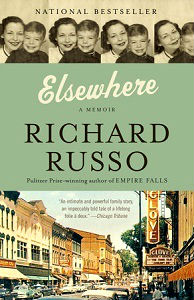
Richard Russo (Johnstown, 15 juli 1949)
Cover
De Franse schrijver Jacques Rivière werd geboren op 15 juli 1886 in Bordeaux. Zie ook alle tags voorJacques Rivière op dit blog.
Uit: Études
"Baudelaire : Il est au milieu de nous. Il ne se retire pas dans les solitudes pour en revenir
poète et prophète ; je l’aperçois dans la rue ; il est préoccupé de ses dettes. Mais il avait une âme. Elle était prête à tout ressentir ; non pas avec dilettantisme, mais comme une pauvresse faite pour la peine et la besogne. L’âme est cette chose inconnue et malheureuse en nous et qui nous épie dans toutes nos aventures. Rentré chez lui, il la laisse se délivrer. Elle parlait sagement, elle racontait ses épreuves sans déchaînement, sans éclat. Et voici que ce n’est plus elle seulement qui s’accuse, mais notre âme à tous, que nous ne savions pas capable de toutes ces passions.
Elle chante, cette âme, et renaissent tous les adorables sourires et secrets du
regret… Cette poésie ne cherche que la confession. Mais ce ne sont pas des épanchements.
Ce n’est pas une sincérité bavarde Elle est multiple, sévère, souriante.
Chaque poème est le doux corps précis d’un sentiment unique. Les vers se posent sur lui comme un vêtement qui le ferait vivre. C’est toute notre âme, avec la violence insoupçonnée de ses amours diverses, que Baudelaire nous a rendue à nous-mêmes sensible. Il est possible que le don soit lourd et qu’il faille du courage pour le supporter. Cette poésie ne rassure
pas ; elle ne verse pas d’illusions. Elle ne prêche pas non plus. Mais elle s’adresse à
ceux pour qui rien n’est plus beau que de connaître son coeur, et de le sentir pesé sur soi."
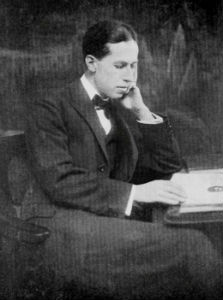
Jacques Rivière (15 juli 1886 – 14 februari 1925)
De Duitse dichter en schrijver Heinrich Peuckmann werd geboren op 15 juli 1949 in Kamen. Zie ook alle tags voor Heinrich Peuckmann op dit blog.
Uit: Nach Abpfiff Mord
„Die Bürgersteige waren wie leer gefegt an diesem bewölkten Sonntagmorgen. Auch auf den Straßen fuhr kaum einmal ein Auto vorbei, so dass die Stadt still war. So still, wie er sie noch nie erlebt hatte. Es war schon ein paar Minuten her, seit ihm ein paar Leute entgegengekommen waren. Eine Familie mit zwei Kindern, dazu drei ältere Frauen. Er hatte grinsen müssen, denn sie waren in Richtung der nahe gelegenen Kirche abgebogen. Die Kirchen hatten genauso mit Zuschauermangel zu kämpfen wie sein Fußballverein. Seither hatten ihm nur zwei übernächtigte junge Männer, die auf einem Blumenkübel am Rand des Bürgersteiges saßen, lallend etwas nachgerufen. Im ersten Moment hatte er sich gefragt, ob sie ihn erkannt hatten und beschimpfen wollten, aber was sie riefen, hatte nichts mit Fußball zu tun. Und schon gar nichts mit dem, weshalb er unterwegs war. Also hatte er sich abgewendet. Sollten sie grölen, was sie wollten, er fühlte sich nicht angesprochen. Nach der Nacht, die hinter ihnen lag, würden sie noch Stunden brauchen, bis sie zurechnungsfähig waren.
An der nächsten Kreuzung musste er die Straße überqueren. Sie war frei, er brauchte sich nicht einmal zu beeilen. Jetzt musste er noch an ein paar Häusern entlang laufen, dann breitete sich zu seiner Linken eine Grünanlage aus, in dessen Mitte das Fußballstadion lag. Das Stadion seines Vereins, für den er seit gut einem Jahr spielte.
Ob es gut gewesen war, hierher zu wechseln? Als er hergekommen war, hatte er sich das öfter gefragt, aber dann war er zum Stammspieler aufgestiegen, zum Schlüsselspieler, der im Mittelfeld die Bälle verteilte. Da hatte er geglaubt, alles richtig gemacht zu haben, und die Frage vergessen. Erst als er vor einer Woche in diesen Schlamassel geraten war, weil er wieder mal die Klappe nicht halten konnte, weil er wieder mal geglaubt hatte, seine Meinung sagen zu müssen, war die Frage erneut aufgetaucht. Warum ausgerechnet hierher, hätte es keine andere Möglichkeit gegeben? Die andere Frage, warum er auch diesmal wieder seine Meinung hatte sagen müssen, obwohl er doch wusste, dass es Ärger geben würde, hatte er sich gar nicht erst gestellt. Er war eben so. Es war seine Art, er konnte nicht dagegen an, selbst wenn er es gewollt hätte. Schuld daran trug sein Vater. „Du musst immer ehrlich sein“, hatte der ihm von Kindheit an gepredigt, „du musst sagen, was du für richtig hältst. Man ist kein richtiger Mensch, wenn man feige seine Meinung unterdrückt.“
Seine Mutter hatte bei diesen Sätzen stets die Stirn gerunzelt. „Aber du musst aufpassen, dass du dir nicht selber schadest“, hatte sie hinzugefügt. „Wenn du Nachteile in Kauf nehmen musst, sei lieber vorsichtig!“
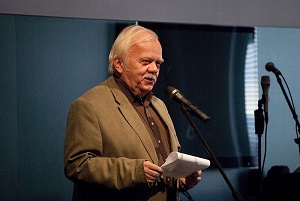
Heinrich Peuckmann (Kamen, 15 juli 1949)
De Duitse dichter, schrijver, vertaler, essayist en uitgever Robert Wohlleben werd geboren op 15 juli 1937 in Rahlstedt. Zie ook alle tags voor Robert Wohlleben op dit blog.
Kino
Genau genommen, hätts so kommen sollen,
wie Lichterspiel vorm dunklen Raum sich staut:
Von weither schwingt die Welle an und baut
sich auf zum Brecher, weithin auszurollen.
Da widersteht die Schattenhand im vollen
Remake und sucht sich im Gesicht die Haut,
sie mählich zu verschatten, bis sie graut
und kontrahiert, als würd sie schaudern wollen.
Im Maskentrick verbacken sich Modelle,
zu Haut und Haar verschwimmt das virtuelle
Gestade, grad als wäre da ein Meer.
Und Bild um Bild treckt an den Strand die Welle
und rührt sich nicht und niemals von der Stelle,
denn aus der Rückpro schwallt die Brandung her.
Vater und Sohn
Grad kreischt vom Thorens, der sich prima hält,
der Eisenschmetterling im Garten Eden.
Die Klingel gellt: Mein Sohn möcht mit mir reden.
Moment … ich hör nichts. So … ist ausgestellt.
Es geht verworren: das Gemüt geprellt,
ein Irren hin durch ungewollte Fehden.
Ach … weiß ichs doch! Ist alles, was noch jeden
ins Schleudern bringt in unsrer tollen Welt.
Erzählen werd ich von Geschichten, die
das Leben besser nicht geschrieben hätte.
Er geht. Es wird ein unerlöster Gang.
Einst wars ein Kettcar, doch nun hat er sie,
geht zu ihr, löst sie sanft von ihrer Kette:
die Tausender mit ihrem satten Klang.
Die Welt ist schlecht
Konstante fünf vor zwölfe weist die Klock:
Die Schlechtigkeit der Welt ist hochverläßlich
und unentrinnbar, wie längst unvergeßlich
besiegelt mit Sonetten des Barock.
Prinzip ist klar: Es gärtnert jeder Bock,
schützt beste Absicht vor, beträgt sich gräßlich,
weiß nichts von Schuld, bis sich am Ende häßlich
die Fratze zeigt: ein immer neuer Schock.
Beliebter Irrtum: Eine Satanshaxe
sei Merkmal all der bösen Schandgesellen
und ihrer rastlos regen Schlangenbrut.
Nee, nee! sind Menschen, die die Seelenachse
justieren, dann auf Dauerfeuer stellen:
aus altem Erbe ewig Tunichtgut.
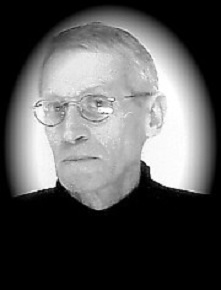
Robert Wohlleben (Rahlstedt, 15 juli 1937)
De Britse schrijver Hammond Innes werd op 15 juli 1913 in Horsham geboren als zoon van een bankdirecteur. Zie ook alle tags voor Hammond Innes op dit blog,
Uit: Wreckers Must Breathe
“Then Thursday dawned, and with it the shock of a newspaper placard at the Lizard—Soviet-German Non-Aggression Pact. I stopped the car and stared at it unbelievingly. Groups of holidaymakers stood about outside the newsagents' reading the papers and talking in low tones. Europe, Hitler, the whole world-fear of Nazism seemed suddenly to have enveloped the place like a sea mist. I jumped out of the car and bought a copy of my own paper, the Daily Recorder. It was true enough, and, what was more, Britain was calling up reserves and there were reports of mobilisation in France. I tossed the paper into the back of the car and drove on to Gunwalloe Church Cove, the other side of Mullion. What was the use of spoiling a holiday by getting upset about the international situation? Wasn't this what I had expected—the usual autumn crisis? But I had not expected a Soviet-German Non-Aggression Pact and I knew that it might well throw all calculations out of gear. The fear of a war on two fronts removed, the German High Command might well decide to make a lightning thrust against Poland and then, if necessary, fight it out with the democracies on the Western Front. I thought it all out as I drove across the Goonhilly Downs with the warm heavy scent of sun after rain in my nostrils, and by the time I had convinced myself that the pact was not as serious as it had at first seemed, it was twelve o'clock, and I was at Gunwalloe Church Cove. Two days ago there had been at least three hundred cars in the park. I counted a bare fifty. The beach seemed empty.Yet it was a glorious day. I had a bathe and then strolled along the beach.A tubby little man in grey flannels with a panama stuck squarely on his head nodded to me:Things look pretty bad this morning, don't they?' he said. `Not too good: I replied. 'But it's a fine day: `Aye: he said, 'that's might, it is. And we'd best make the most of 'em.Two men in our hotel have been called oop.Wired for last night: Five minutes' conversation with this gentleman left me with a feeling of utter depression. I had lunch and tried to settle down to read, but my mind would not concentrate and I was conscious all the time of the emptiness of the beach. I had my third bathe of the day and went home to tea to find the cottage empty of visitors.”
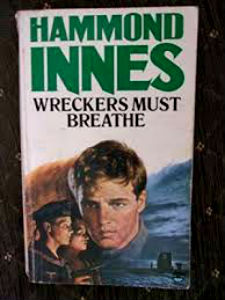
Hammond Innes (15 juli 1913 – 10 juni 1998)
Cover
Onafhankelijk van geboortedata
De Iraanse dichteres, schrijfster en vredesactiviste Rira Abbasi werd geboren in 1962 in Khorramabad, Iran. Zie ook alle tags voor Rira Abbasi op dit blog.
Poets of Peace (Fragment)
Their flags has a color, has a shape,
has a star, has a moon.
With smiling orange sun
Watch the cartoons!
Watch the animals in jungles!
The mouse and the cat are kind,
They love their children.
Shame on you!
Getting a piece of bread is not hard.
It needs no gun and no fight.
Every house has a door and window.
Daddy, mommy and their kids,
They need peace and comfort,
Children need to study, to be happy,
Watch football games, pretty flowers, and swim.
They want to grow up,
They hate bad dreams,
They want to think,
They like to fly like swallows,
Having a green branch in their mouth.
Fly high and plant olives on the moon.
Let’s be kind to each other,
No matter how much bread, how many children
Appreciate each other,
Sing with a healthy soul:
We need no more bread, not a big belly.
We need no guns, no wounded men in fights,
Hostility is meaningless.
If we are friends,
If we are good neighbors
We can borrow; we can lend water and bread
We need no war!
Why are rockets expensive?
Vertaald door M. Alexandrian
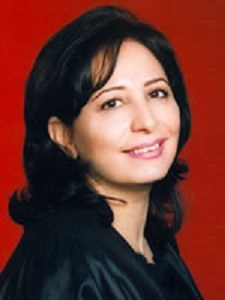
Rira Abbasi (Khorramabad, 1962)
Khorramabad
Zie voor nog meer schrijvers van de 15e juli ook mijn blog van 15 juli 2017 deel 2.
|



